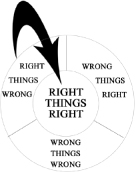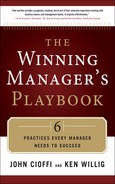INTRODUCTION
Like quiz show contestants, managers are constantly guessing at the right answers. Unfortunately, they often don’t know if they even have the right questions, and rarely has anyone coached them on being effective managers. No wonder they’re stressed, second-guessing their actions, and fearful for their positions.
This is especially true today, when change is rapid, frequent, and almost routine. Our businesses are in constant flux, customers are global and ever-changing, markets quickly emerge and wane, and product life cycles are shorter than ever. CEOs and owners challenge their managers to adapt to this changing environment, while expectations for a life-long career at National Widget have long disappeared (along with the pension).
So what will you do? How can you be a successful manager in today’s environment?
We’ve looked at many successful companies and read countless stories of successful and unsuccessful organizations across decades of varying economic conditions. We’ve concluded that there are six key and basic practices that you need in order to be a successful manager. These practices are basic building blocks—they are neither faddish nor outdated, but enduring in their value and effectiveness.
The Winning Manager’s Playbook describes these six practices. Using these six practices will compel you to do the Right Things (good leadership) as well as to do Things Right (good management). In effect, The Winning Manager’s Playbook provides you with a road map for doing the Right Things Right. It also helps you avoid the other three options, which are roads to failure.
Doing the Right Things Right

Many managers use one or more of these practices at one time or another. For example, after a long period of aimlessness, a manager may decide to define her division’s goals and to construct a plan for the coming year. Another manager might adopt some effective management practices in response to a period of chaos, while yet another might decide to improve his operations by “weeding out the dead wood” and replacing the non-performers with “folks who can do the job.”
Unfortunately, and predictably, these measures alone often are unsuccessful. And this sometimes leads managers to conclude that they are inherently ineffective.
For example, consider the manager that just decided to set some goals and make a plan for the coming year. Without the discipline and accountability to actually implement the plan, her division almost certainly will not achieve its goals. Perhaps even worse, the manager will initially raise expectations only to leave her team demoralized and disillusioned by inaction or lack of success. The result will be a team that would have been better off if no goals had been set and no plans made! At least the day-to-day “muddling through” would have had the comfort of an established routine.
Companies that use The Winning Manager’s Playbook in a consistent and habitual way create a compelling environment for success. There’s only one hitch—you actually have to do this stuff. And make no mistake, being consistent in applying these practices is not easy for everyone—it takes a change in habits, followed by discipline and commitment.
When a company employs The Winning Manager’s Playbook effectively, it creates systematic processes that engage everyone in achieving the company’s goals. In effect, the firm creates a culture of achievement and accountability that builds upon the collective abilities of the team to ensure the firm’s success.
The Winning Manager’s Playbook includes several means of illustrating our point of view. These include actual client stories, plain narratives, and a composite story of a construction-related company owned by “Mike.” Mike’s “voice” in these stories is remarkably similar to the voices of owners we have known throughout recent years, and the points illustrated in the brief stories of Mike’s company are common to businesses across industries and across the country.
An important premise of The Winning Manager’s Playbook is that many managers will need to make some type of change to adopt these habits. We know that for many people, this isn’t easy.
Making changes, whether personally or within a business, takes courage and persistence. Although we may “know” that some type of change is needed, many of us are resistant to making that change.
This resistance often breaks down, however, when we realize that we are not operating the way we’d like and that there is a relatively easy means of operating better. That is the power of The Winning Manager’s Playbook—the practices outlined here allow you to manage your organization more effectively and efficiently and to create successful results.
A final note concerns one of the lessons Mike uses to keep his employees focused on their goals. He calls this story “Don’t Pick Up Nails.”
The bright shiny nails that are so frequently dropped by the carpenters on typical construction jobs are not useful. Picking them up is a distraction, a waste of time, and therefore a waste of money. The carpenters need to be framing the building, not picking up nails.
So too do you need to be focused on the six practices described in The Winning Manager’s Playbook. And so too do you need to ignore the many bright and shiny distractions that come along every day.
